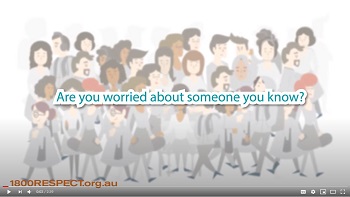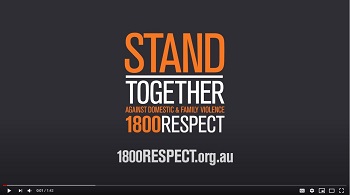Family and domestic violence

Anyone can be affected by family and domestic violence. If you have experienced it, it is not your fault. At Notre Dame, we are committed to providing dedicated support services for students who have experienced family and domestic violence to support their wellbeing and continued engagement with studies.
-
What is family and domestic violence?
Family and domestic violence happens when one person in a relationship hurts another person or makes them feel unsafe. It can occur within intimate partner relationships (e.g. current or ex boyfriends or girlfriends) and between family members. A person can experience family and domestic violence directly and/or by witnessing it as a family member.
-
What does family and domestic violence involve?
Family and domestic violence can occur in a range of different ways. People who are exposed to family and domestic violence may experience behaviours such as:
- Physical violence - when someone deliberately hurts your body or takes away your control of your body. Some examples are slapping, hitting or kicking; restraining your movement physically or through the use of alcohol or other drugs; someone saying they will physically hurt you.
- Sexual violence or sexual coercion – some examples are a person looking at or touching any part of your body in a sexual way when you do not want them to; bothering you on social media with sexual messages, posts or pictures; following you and saying or doing sexual things; telling rude jokes.
- Psychological or emotional abuse – examples of this include treating you badly because of things you can’t change (e.g. your race, past, disability, gender, sexuality, or family); embarrassing you in public or in front of family, friends, or people you study with; saying things with the aim of making you look or feel foolish.
- Financial control – for example, using money in ways that hurt you; preventing you from getting a job; making you get loans you don't want.
- Religious or spiritual abuse – some examples are shaming or insulting your religious or spiritual beliefs; preventing you from practising your religious or spiritual beliefs; using religious or spiritual leaders or teachings to justify or excuse violence or abuse.
- Social abuse – for example, cutting you off from friends, family and community; making attempts to harm your relationships or reputation.
- Stalking – examples include when someone won't stop bothering you with unwanted contact or attention; repeated texts, emails or social media messages; using social media to track you, bully or intimidate you, or bother you with unwanted attention. The behaviour may start out seeming friendly but get angrier or even violent over time.
Many family and domestic violence behaviours are about an ongoing pattern of conduct aimed at controlling a partner or family member through fear of violence. It scares you into changing your routine and behaviour and stops you from feeling safe.
These are just some of the examples of family and domestic violence behaviours which are discussed on the 1800RESPECT National Sexual Assault, Domestic Family Violence Counselling Service website.
-
What are the signs of family and domestic violence?
People who experience family and domestic violence may do some or all of the following:
- See friends and family less than usual
- Suddenly stop going out without a reason
- Receive an unusually high number of texts or other messages from their partner or family member
- Worry a lot about making a particular person angry and/or be scared around a person
- Make excuses for someone’s negative behaviour
People whose behaviour is violent or abusive may:
- Put the other person down all the time
- Make threats to hurt another person
- Act in ways that make the other person scared
- Control
- where someone goes
- how and when they can use their phone, car, or computer
- who they see and speak to
- what happens to their money
- Have a lot of rules about how the other person is allowed to behave
- Get very angry when the other person doesn’t follow these rules
For further information, visit the the 1800RESPECT National Sexual Assault, Domestic Family Violence Counselling Service website.
-
How to support someone who is experiencing family and domestic violence
If you suspect that someone is experiencing family and domestic violence, it can be hard to know what to do. You can try asking them. It is good to pick a quiet time, when the person can speak in private. If they are not ready to speak, don’t force them. You may worry that the person will be angry with you for asking. That may happen, but often people are glad to be able to talk about what they are going through.
1800RESPECT Support a Friend
Do you know what to look out for or how to safely support a friend experiencing domestic violence?When speaking to the person, sometimes it can be better if you talk about things you’ve noticed that are making you worried. This can be less confronting than if you give your opinions.
Questions you could try
- How are you?
- I’ve noticed you have a mark on your arm. How did that happen?
- I’m wondering if things are OK for you at home?
- I’m finding it really hard to juggle my studies and work right now. How are you finding it?
- I’ve noticed that you seem to be frightened by [the person you suspect is involved]. Is that correct? What is happening?
Responding to Domestic Violence
What you do can make a difference. Find out how to safely support someone that is affected by domestic or family violence.Things you can do to help
It can be hard finding out that someone is experiencing family and domestic violence. You can make a big difference by listening with respect and empathy. Do not try to take control of the situation, or make judgments. The person may feel trapped and out of control of their life. If you try to tell them what to do, you could make things worse. It is better to listen without judgment, and to offer to help the person connect with support services, so they can make their own choices about what to do.
Ways you can help:
- In an emergency, call triple zero (000)
- Listen to the person with respect and empathy. Do not judge or express opinions about the situation or the people involved. Do not tell the person what to do
- Never blame the person for what has happened to them
- Remember that family and domestic violence is not just physical – it can take other forms (see above)
- Help the person in practical ways – e.g. with transport, somewhere to escape to
- Help the person to connect with support services such as a University Respect Officer or 1800RESPECT. If the person doesn’t feel ready to connect yet, you can seek support on their behalf.
-
The impact of COVID-19 on violence against women
Since the COVID-19 pandemic began, rates of family, domestic and sexual violence have increased across the country and globally, and women in particular are affected. For information refer to The Shadow Pandemic, a resource produced by Universities Australia which contains facts and figures, and information about where to get help.
If you have experienced family, domestic or sexual violence you are warmly encouraged to access University support services or external services, who can talk to you about what has happened and support you. You will not be required to take any action or make a formal report, unless you wish to. For more information, please refer to the University webpage If you have experienced sexual assault, sexual harassment or family & domestic violence.
-
Where to get help
If you have experienced family or domestic violence, help is available at Notre Dame.
University Respect Officers are available on each campus to provide specialised coordinated support for anyone who has been impacted.
Free and confidential counselling for students is available from the Student Counselling Service and staff can access counselling through the University’s EAP Provider.
Further information for staff is available here. Staff are also encouraged to contact safety@nd.edu.au or a Respect Officer if they require support.
If you are interested in learning how to Recognise-Respond-Refer, online self-paced learning is available here. -
Domestic and Family Violence response training
Building capacity in managers to learn how to Recognise-Respond-Refer
If you are interested in this online self-paced learning please click to register.
-
Change the story
This video illustrates the drivers of violence against women and what works to prevent it based on the national framework, Change the story: A shared framework for the primary prevention of violence against women and their children in Australia.



Connect with Notre Dame on Social Media
Australia
Fremantle
Broome
Sydney